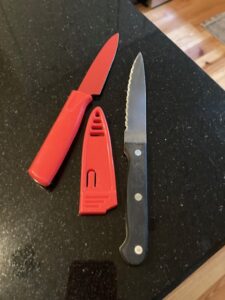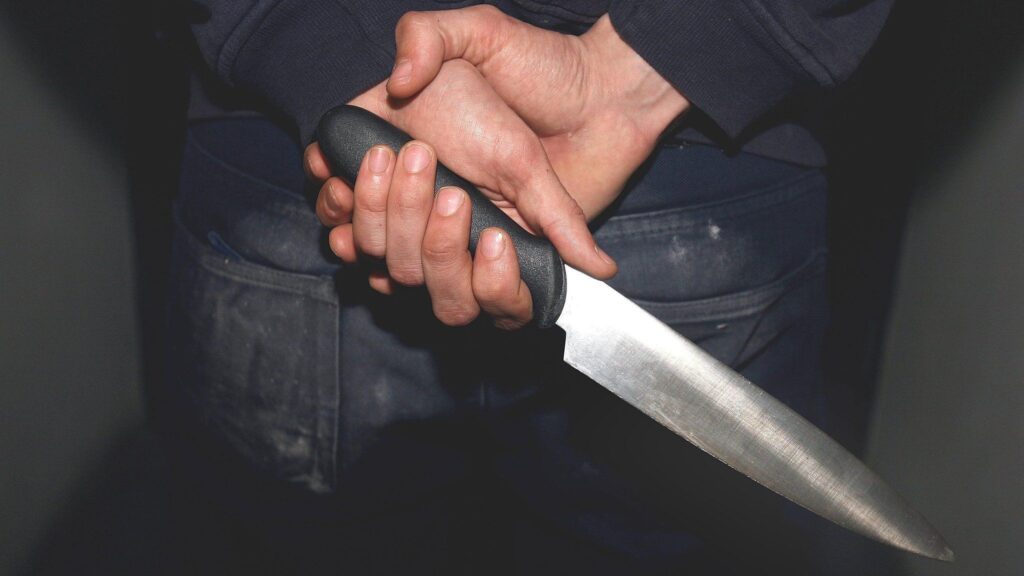It’s none of their business that you have to learn to write. Let them think you were born that way.” — Ernest Hemingway
By PJ Parrish
If you want to do it right, you need a good sharp knife.
I never believed this until recently. For decades, I struggled along with cheap knives picked up at yard sales or the sale rack at Target. Useless, these dull tools all eventually found their way to a sad dark drawer of my kitchen, leaving me dependent on one little plastic job and an old serrated steak knife to do everything I needed, from slicing a tomato to carving a turkey. (See actual evidence below).
Which leads me to my friend Peter. He was a terrific cook and believed in good knives. He had a set of Wüsthof knives, which I came to learn was the ne plus ultra of knives. He kept them whetted and ready. When he would come to my place for dinner, he would scoff at my pitiful duo. “You can’t be a serious cook without good knives,” he said.
Peter left me his knives when he died last spring. They came to me in a box, gleaming and razor sharp. They frightened me. I was sure I’d slice an artery if I tried to use them.
Well, I didn’t. I came to appreciate the way the paring knife could effortlessly slice a cuke paper-thin. I loved the way the 8-inch utility knife churned through an onion. Carving a roast with the 10-inch chef’s knife was an epiphany. The right tools have made me a better cook.
Life is like this. Sometimes, you’re tempted to make do with the inferior, to take the easy route, to tackle a task with less-than. You folks out there who do carpentry or gardening know what I mean. You buy shoddy tools, you get shoddy results. Or you have to work twice as hard. Or you slice off a finger.
You can probably tell by now that this is a metaphor. As in life, a writer can’t get the job done without acquiring the right tools. You have to learn the craft. And here’s something you’re not going to like to hear: What tool you seem to lack, that’s the one you need the most.
Where do you find the right tools? Well, there are a million how-to books out there in the ether. Not all are good. Most are dull, and many are useless and should be stuck in a kitchen drawer. So let me suggest you start with The Kill Zone archives. Our contributors are laser-focused on practical craft advice, and a couple of us have written some pretty good how-to books. See that search box at the right top of this page? Type in what you need and you’ll find the tools.
Don’t be afraid to face your weakness. Find the right knife for the job you need done.
Are you bad at plotting? Does your story have a thicket of sub-plots obscuring the true story? Does your plot lack dramatic arcs (“What’s an arc?”) Does your middle act sag? Well, type “plot structure” in the search box. Great tips galore. Start with this one from James Bell, which is a basic lesson in why plot and character go hand in hand. Trouble coming up with a great ending? Debbie has it down. Type in sub-plots, or three-act structure, layering scenes or chapter transitions and you’ll find more knives.
Are your characters lacking? Are they stereotyped, unbelievable, wooden or one-dimensional? Every great story begins and ends with great characters. If this is your weakness, find the tools to help. Start with this post from Jordan. Need to learn about motivation? Type in “man in the mirror” or “What does your character want?”
Does description leave you cold? We can’t all be Elmore Leonard. Most of us need at least a little descriptions to make our readers care. I love description so whenever my sister and I got to this, she’d shovel the football to me. Or she’d send me back a chapter she had worked on with big read capitals saying: INSERT DESCRIPTION OF MANSION HERE. I finally forced her to do it herself so she could learn. And she did. Start with this post for some great tips.
Stymied about your setting? You can’t tell a story without creating a world. Setting is, to my mind, one of the most neglected aspects of craft that I see in our First Page Critique submissions. If you struggle with this, check out Terry’s guide here. Or read Jordan’s inspiring take.
Is your dialogue tone-deaf? Dialogue is action. Dialogue is sleight of ear. Dialogue is hard to get right. It might be the hardest writing craft to master. Here’s a terrific primer to get you started. What point of view works best for your story? Let John Gilstrap clarify things here. Should you use a dialect? Read this first. Does your dialogue sound fake? Try this knife.
One last piece of advice. Knives get dull. Even the really good German ones. You have to get them professionally sharpened, at least every couple months. I go to Precision Sharpening & Key Shop where Jeff (that’s him and Bird at left) keeps me sharp. Not sure where the metaphor is here, other than to say that even old dogs like me — even the most experienced writers, and especially the well-published — need to keep their craft honed. Or they lose their edge. And as anyone can tell you, when you lose your edge, you lose your readers. And now, I am off to pick up my knives from Jeff. Stay sharp, my friends.

This post is dedicated to my friend Peter, who loved food, knives and the Redskins. He is wearing a Dolphins shirt because he lost a bet.



This is terrific, Kris. Great metaphors, informative, funny and poignant…and links to some of the sharpest blades in the Kill Zone drawer.
I’m sorry about the loss of your friend. The symbolism of his leaving you what were undoubtedly among his prized possessions speaks volumes.
I’m fond of knives myself (though for other purposes) and indeed, one needs to spend the money for a quality tool. You don’t want equipment failure at a crucial time. Thanks for the reminder.
My ex husband once gave me a deluxe Swiss Army knife for my birthday. I thought it was a dumb gift, sort of not-very-romantic. But I grew to love that darn knife. It has everything from scissors to a cork screw. I still carry it in my purse 40 years later. Once, going into a courthouse for jury duty, I forgot I had it. The guard, who said he was a knife guy himself, said he was supposed to confiscate it but then whispered “Just go hide it outside.”
And one night, when I was watching MacGyver and Hubster was in the room, I muttered, “Why don’t I have one of those?”. I wasn’t aware he was listening since my words were directed at the television set, and he was on the other side of the room. But that Valentine’s Day, I got a Swiss Army Knife, which then became one of the most romantic gifts he’d given me. Because he’d LISTENED. And I wasn’t talking to him!
It lived in the bottom of my purse. Until I forgot it was there and the TSA people at SEATAC found and confiscated it. (Funny, but it had passed security in Orlando and a hand inspection in Atlanta, so I was convinced I’d removed it before we left home.
Oh man, sorry you knife got confiscated. I DO remember to pack mine when I fly. And I never travel without that thing. It has gotten me out of many a jam. And is good for opening wine during a roadside picnic.
I buy a lot of knives from the TSA. Go to Ebay. Search TSA Confiscated. Just know what you are looking for. There is a lot of trash knives in there as well.
Does your WIP need a murder weapon? A lot of used knives on Ebay.
Also on Ebay, search for Victorianox. You can buy Swiss Army Knives by the dozen.
The esoteric wisdom in our hive never ceases to amaze me.
I’ve learned the hard way that knives both metaphorical and literary cannot be over-sharpened. I’ve also learned that sometimes authors that make writing look easy actually have terrific editors helping them pull off that magic trick. There are many wonderfully talented folks here at TKZ with bucket-loads of wisdom to share.
They, and the TKZ site, have been a God-send in my writing education!
Oh yeah…editors! Don’t know how we can fit them into the metaphor, but they are invaluable accessories to our writing process. Glad you enjoy our site!
I’d call editors the sharpening stones. Whetstones? Honing thingies?
I have nothing to offer to your fantastic post (as always). I’ve just hit “The End” in the current manuscript and will refer to these as I dive into edits. First drafts always need those tools.
My soon-to-be-son-in-law comes to visit with his knife-sharpening tools in hand. Now, if he could sharpen my prose.
I brought back some good German knives when I visited Germany. Somewhere along the line, the paring knife disappeared. Once I was convinced it wasn’t going to show up, I drove all the way down the mountain to buy a new one. A set of two, actually. It was a debate between Wusthof and Henckels (with the 2 figures on the blade–my mom’s tableware had Henckles knives)
I actually bought a Henckle myself oh, ten years ago. But I didn’t properly take care of it. (ie get it professionally sharpened and use a whetting tool). It died a sad death.
My Henckels are 30 years old. Once a year they spend a few days at a restaurant quality knife shop.
I like the way knives are taking on a creature quality in this thread. Knives with good owners get to go to the knife spa.
Great post. Thanks for all the links. “Every writer need sharper tools.” The same goes for woodworking. Not only is a dull tool harder to use, it doesn’t do its job properly and is more dangerous.
Loved the SNL – Julia Child skit. Do keep a first aid kit in your workshop. Not sure what the writing metaphor would be. Maybe all the resources you listed to correct out deficiencies? (after we’ve butchered our first draft)
How far can we take the metaphor? 🙂
Yeah, I learned the hard way that a dull knife is more dangerous. You try to make the knife do things it can’t and it turns on you. I have two small stitches in an index finger from trying to slice a bagel with a bad knife.
First aid kit for me are my betas…ha!
Thanks for the shoutouts, Kris. I often refer to the craft as a set of tools. Learn to use them, put them in your tool belt, and go write. Reading here about the utility of knives reminded me of my dad teaching me to play Mumblety-Peg. If you know what you’re doing, a knife can be fun, too. Like writing should be!
To all reading comments here, please check out James’s writing craft series. Excellent. I have recommended them many times to folks looking for keys to unlock their problems because they are SPECIFIC to whatever your issue is.
LOL! When I first saw the title of this post I thought you were going to dissect the murder mystery movie of the same name that came out last year. 😎
Not only do we need to keep refining and sharpening our writing skill, it is part of the fun of writing.
I really enjoyed that movie. I have nothing salient to say about it other than that. 🙂
Great post, Kris. I love the metaphor. The Kill Zone blog is at the top of my stack of writing tools.
Thanks, Kris!
Ackroyd’s Julia reminded me of one Thanksgiving when I sliced a little artery (which I learned is called an “arteriole”) in my thumb and wound up in the ER getting stitches.
But the most important reminder from this excellent post is the amazing TKZ reference library. It archives more than a decade’s worth of deep dives into every conceivable subject. Go back to posts from 2010 and they remain timeless and relevant today.
For years before I was fortunate enough to become a contributor, I faithfully followed this blog. TKZ deserves credit for boosting my skills to publishable level.
A writer could earn an MFA from TKZ…for free!
I enjoyed reading through the old posts for this. Forgotten how good they were.
For your metaphoric enjoyment: There’s a story about an old lumberjack, famous for his skills, and a young and arrogant one. The young one is always bragging about how awesome and strong he is with his powerful ax swing, and how pathetic the old man is. The old man just ignores him because he’d seen too many young men just like him. Finally, the other lumberjacks insist they have a contest to prove who is better to shut up the young man.
The next morning, both men start their contest. The young man is plowing through the trees with great speed and no break, but the old man just keeps cutting steadily and taking a five minute break every hour. Of course, the young man makes fun of him, but at the end of the day, the old man had taken down many more trees.
The young man is stunned and finally humbly asks how the old man beat him. “I was sharpening my axe during all those breaks.”
{{{rim shot}}}
Love that story.
Excellent post, Kris! It’s in my file, with all the links.
And loved seeing the video again…I never stayed up late enough to catch SNL, but have seen some clips and this was undoubtedly one of the best.
I can’t get anything done during my day until I’ve checked in with y’all. I’ve tried to steer some of my unpublished writing buds to this website over the months. It’s just the best…as all of you are.
🙂
Deb–coming here is now part of my early morning writing ritual, too 🙂
I always drop in every morning. Don’t always have anything interesting to add, but it’s always good to eavesdrop.
Another terrific post, Kris! These are very helpful tools to have in one’s writing tool chest. I know my own writing benefited enormously from my stepping onto the “path of craft” back in 2008 and not looking back. You are so right–these “knives” need to be sharpened lest they go dull. I take heart from this–it means I’ll always have work to do and improvement to strive for in my own fiction 🙂
When I was editing this post for the final time late yesterday (we have to be our own editors here), I ended up cutting out at least one digression graph and about 100 flab words that I didn’t see on the first couple pass-throughs. No matter how many times you re-write your work, you can always find something to prune.
Thanks for this, Kris. All excellent links. When I scroll through old Kill Zone posts I’m amazed at how many different subjects have been covered over the years. It’s a treasure trove of valuable craft advice.
There’s nothing like a good set of knives. And pots & pans!
You know what kitchen item I am packing in my luggage for my move to Panama? My good German knives. Good knives are worth every penny, and properly taken care of will last forever. Don’t skimp on knives.
Or mattresses.
Wow, you are officially the Queen of the Deep Dive. Thanks for the nod–and to the link from nearly nine years ago! I’d forgotten that I’d written it.
Great post.
I just typed in topics and the posts came up. Many of them were from before my tenure here and were fun to discover.